Religious freedom laws are ‘harming LGBT people,’ says Human Rights Watch
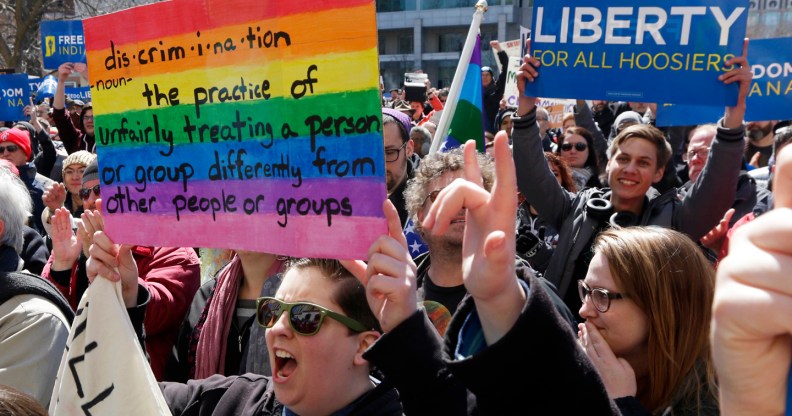
(Getty)
One of the largest human rights groups in the US has released a new report criticising the spread of religious freedom laws due to their impact on LGBT people.
The US is currently embroiled in a battle between so-called religious liberty and LGBT people that centres on whether Christians should have the ability to discriminate against gay people.
Many of these laws allow businesses and organisation the ability to use so-called “religious exemptions” to legally deny LGBTQ people employment, housing, adoption rights, marriage licenses, and even services at a local business.
Earlier this week Human Rights Watch released a year-long study on LGBT people in the eight states that currently have these laws in place to see how these religious freedom bills had affected them.
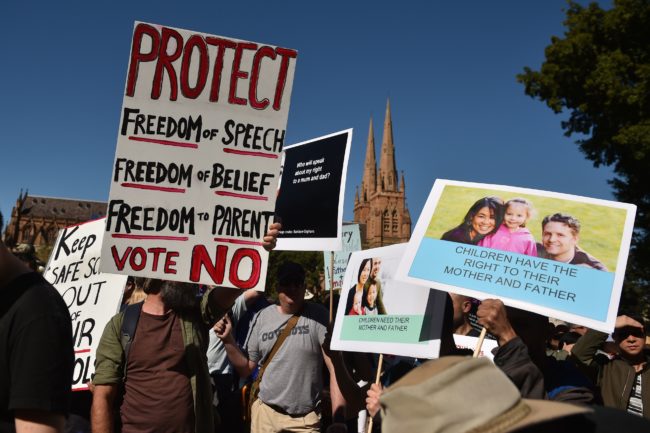
Anti-same-sex marriage protesters in Australia (PETER PARKS/AFP/Getty Images)
The charity interviewed 112 LGBT people and groups in Alabama, Michigan, Mississippi, North Dakota, South Dakota, Tennessee, Texas, and Virginia.
The report concluded that these laws significantly harmed the dignity and health of LGBT people and criticised the lack of federal protection against discrimination.
Human Rights Watch criticised the idea that these laws were anything other than an excuse to discriminate against LGBT people and directly blamed the spread of religious freedom laws on the backlash to national marriage equality in 2015.
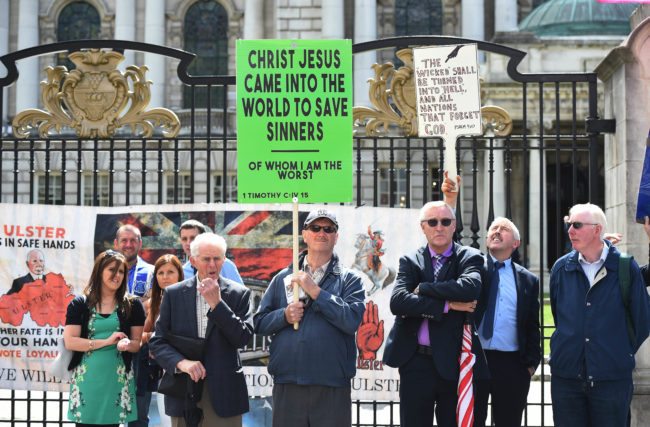
(Photo by Charles McQuillan/Getty Images)
The report says: “In fact, with few exceptions, the laws as drafted create blanket exemptions for religious believers to discriminate with no consideration of or even mechanism for consideration of the harms and burdens on others.
“The failure of most states to enact nondiscrimination protections and the growing number of religious exemption laws leave many LGBT people with little recourse when they encounter discrimination.”
As of 2018, only 19 states and the District of Columbia explicitly ban discrimination on the basis of sexual orientation or gender identity.
In some cases, religious freedom laws can overrule and conflict with local anti-discrimination laws.
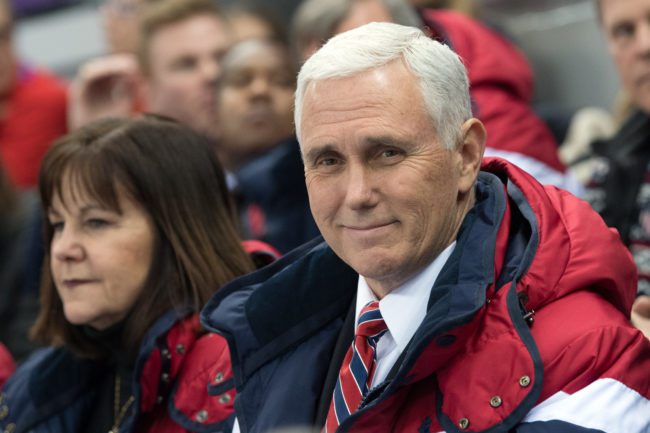
(Photo by Carl Court/Getty Images)
One case of this was seen in 2015 when current Vice President Mike Pence signed a state-wide religious freedom bill as governor which conflicted with local anti-discrimination protections in the state capital of Indianapolis.
This lack of federal protection was heavily criticised by Human Rights Watch, who said that the laws made discrimination the norm for LGBT people.
“They give LGBT people reason to expect discrimination before it even occurs, and to take extra precautions or avoid scenarios where they might face hostility out of self-preservation,” said Human Rights Watch.
“Such laws also threaten the basic dignity of LGBT people, sending a clear message that their rights and well-being are not valued and are contingent on the goodwill of others.”
The report continues: “Some individuals will obtain the good or service they sought, but will face additional costs: finding an alternative provider can require time, energy, and money, which can prove discouraging or even prohibitive.”
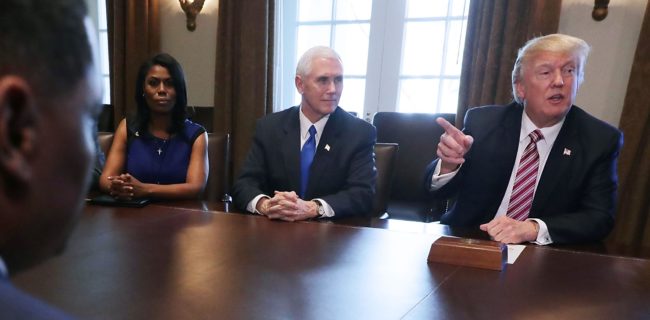
(Photo by Chip Somodevilla/Getty Images)
One of the people interviewed for the study highlighted how Mississipi’s law granting so-called “religious exemptions” to legally deny LGBTQ people employment and services had encouraged people to discriminate.
She said: “It’s not like they couldn’t have done this stuff before… but laws like HB 1523 have emboldened people, and they have a list of what they can do now.”
Human Rights Watch warns that six other states are likely to consider enacting similar legislation in 2018.
Federal support for religious freedom bills and the right to discriminate against LGBT people on faith-based grounds has grown under the Trump administration.
During his annual presidential proclamation earlier this year, Donald Trump announced that January 16 would be known as Religious Freedom Day.
Trump expressed support for the ‘freedom to discriminate’ in the proclamation.
He did so after breaking with Barack Obama’s eight-year tradition of issuing annual proclamations recognising June as LGBT Pride Month.
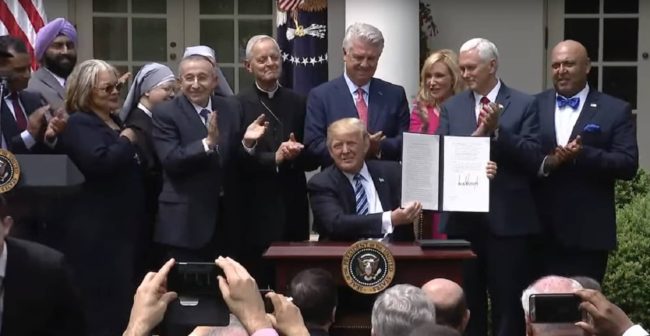
Trump signs a religious freedom bill (Getty)
“Unfortunately,” the President wrote, “not all have recognised the importance of religious freedom, whether by threatening tax consequences for particular forms of religious speech, or forcing people to comply with laws that violate their core religious beliefs without sufficient justification.”
He added: “No American — whether a nun, nurse, baker, or business owner — should be forced to choose between the tenets of faith or adherence to the law.
In 2017 the Trump administration told the Supreme Court that it should be acceptable for businesses to put up signs denying service to same-sex couples.
Related: Trump’s ‘banned words’ projected onto the front of his Washington DC hotel
Trump’s Solicitor General was supporting Jack Phillips of Colorado’s Masterpiece Cakeshop, who launched a legal challenge to the state’s anti-discrimination laws after refusing to serve a gay couple.
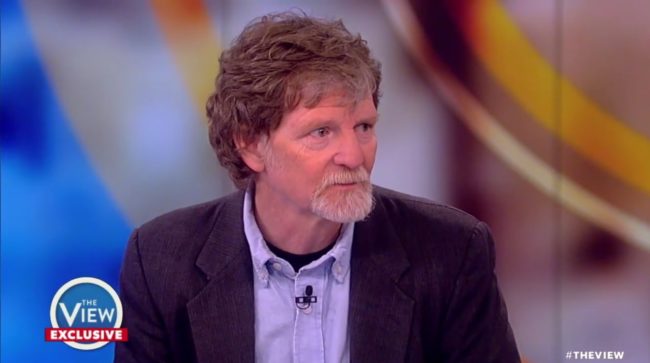
The baker refused to make a cake for the couple after he found out they were celebrating their wedding.
Mr Phillips claims that Jesus Christ would discriminate against gay people, and continues to insist his religion requires discrimination against gay people.
LGBT campaigners say that if the court sides with Mr Phillips, the case threatens to blow a hole in decades of civil rights laws and anti-discrimination protections across the US.

